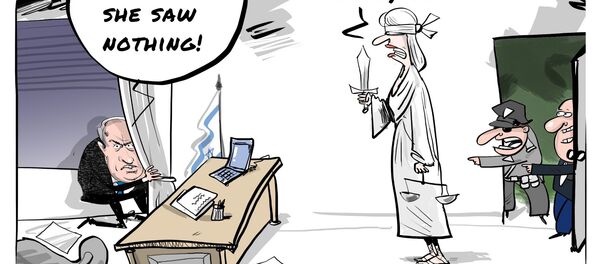Speaking to Sputnik, al-Halabi, a political analyst and regional expert based in Syria, recalled that the Israeli investigators' recommendation to indict Netanyahu for bribery, fraud and breach of trust was nothing new.
"This isn't the first time that Prime Minister Netanyahu is being questioned for corruption and bribery," the analyst said. "After the end of his [first term] as prime minister, a job he held from 1996 to 1999, his house was searched, because he had embezzled things which he had to return to the government," he added.
Despite police recommendations to hold a trial, the country's attorney general decided against prosecution at the time, citing 'difficulties' with evidence.
According to al-Halabi, even if a trial against Netanyahu were to go ahead this time, the case would unlikely be transparent, and he would escape justice. The story of Ehud Olmert, the former Israeli prime minister convicted and sentenced for bribery and obstruction of justice in 2009, was more an exception rather than the rule, the observer argued.
For his part, Aiman Salamah, an Egyptian professor of international law, pointed out that if Netanyahu were indicted and then found guilty, "he will face a fine, or even up to ten years in prison, as was the case with Olmert."
At the same time, Salamah stressed that if charges were leveled, there would be no chance of immunity for Netanyahu based on his high post. "Under both international and Israeli law, the post of the accused does not relieve him or her from responsibility for crimes committed, and does not mitigate punishment," the observer said. For this reason, Salamah believes that if Netanyahu is tried and convicted, he will not be able to hide from justice by means of his office.
Netanyahu has fought back, slamming the police probe against him, calling it full of holes "like Swiss cheese" and saying that the truth would eventually come out. Israeli Attorney General Avichai Mandelblit will now have to decide whether or not to proceed with the case.



